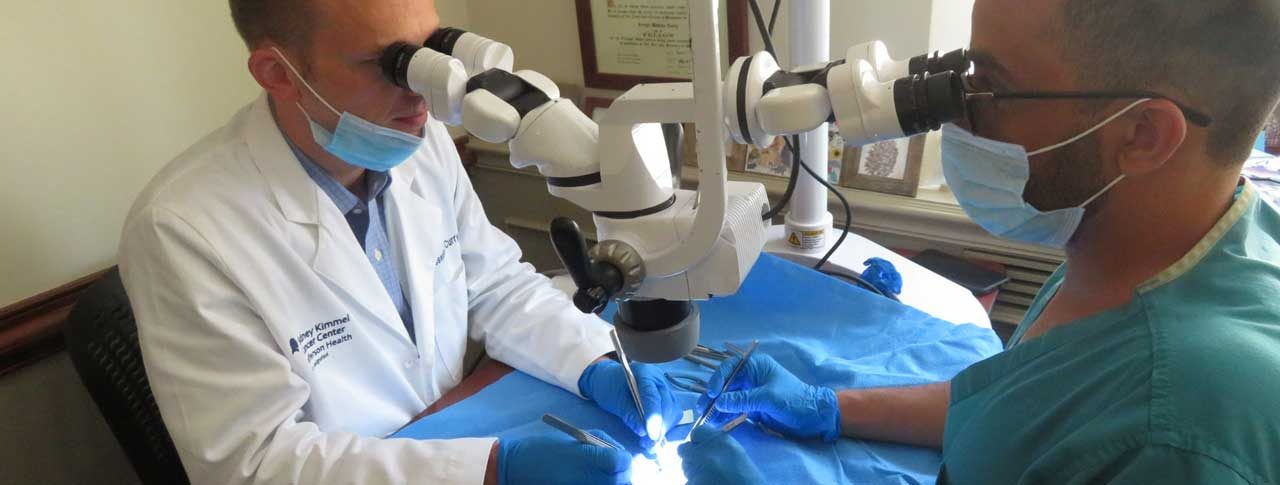Breathing Issues That Point to the Need for Otorrinolaringologia Support
Breathing Issues That Point to the Need for Otorrinolaringologia Support
Blog Article
Discovering the Field of Otolaryngology: What to Expect When You Consult an ENT
Otolaryngology, commonly referred to as ENT, incorporates the medical diagnosis and therapy of nose, ear, and throat problems. For those experiencing associated issues, getting in touch with an ENT professional can give quality and alleviation. Recognizing what to expect throughout such appointments is important for effective interaction and treatment. This introduction will certainly outline vital facets of the ENT experience, consisting of usual reasons for check outs and the procedures involved in medical diagnosis and treatment.

Understanding Otolaryngology: A Review
Otolaryngology, usually referred to as ENT (Throat, ear, and nose) medicine, is a specialized branch of medication that concentrates on the medical diagnosis and treatment of conditions affecting these critical locations of the human body. This area includes a variety of problems, consisting of those related to hearing, balance, breathing function, and speech. Otolaryngologists are educated to manage both clinical and surgical treatments, using innovative techniques and technologies. Their knowledge expands past traditional conditions, dealing with concerns such as allergies, sinus infections, and hearing loss. Additionally, they play an essential duty in the management of head and neck cancers, giving extensive care customized to individual person requirements. On the whole, otolaryngology remains necessary for preserving health and lifestyle in affected people.
Common Reasons to See an ENT Expert
Several people look for the experience of an ENT specialist for a selection of reasons, showing the diverse nature of problems that impact the nose, throat, and ear. Common concerns consist of persistent sinus problems, which usually causes consistent nasal congestion and face discomfort. Allergies and their linked signs and symptoms, such as sneezing and itching, additionally prompt brows through to these specialists (ENT Clinic). Hearing loss, whether abrupt or progressive, is one more considerable factor for assessment. Furthermore, people might seek evaluation for throat problems, including relentless hoarseness or swallowing troubles. Sleep apnea, defined by cut off breathing during rest, is often dealt with by ENT specialists. Each of these problems highlights the relevance of specialized treatment in handling complex ENT-related health problems
Getting ready for Your ENT Visit
When preparing for an ENT consultation, it is vital to collect appropriate details and think about any details issues. People should compile a thorough medical history, including previous ear, nose, or throat problems, surgical procedures, and present medications. Recording signs-- such as period, seriousness, and regularity-- can provide beneficial insights for the ENT professional. In addition, individuals must prepare a checklist of concerns they desire to ask, ensuring that all problems are resolved during the see. Bringing along any relevant medical documents or examination results can additionally aid the ENT in recognizing the patient's condition. People should validate their visit information, including date, location, and time, to minimize any type of final complication. Correct prep work can boost the efficiency of the assessment and bring about far better outcomes.
What to Anticipate During the Appointment
As the assessment starts, the individual can anticipate to take part in a thorough discussion with the ENT professional regarding their signs and case history. The specialist will inquire about the period, regularity, and seriousness of signs such as hearing loss, nasal congestion, or sore throat. In addition, the client's previous clinical conditions, medicines, and any type of relevant household background will be assessed, aiding the professional in creating a total understanding of the person's health. The ENT might also inquire about way of life aspects, such as direct exposure to irritants or irritants. This open discussion establishes a structure for the assessment, guaranteeing that the individual's issues are dealt with and setting the stage for any required evaluations or recommendations for therapy.
Diagnostic Examinations and Treatments in Otolaryngology
An array of diagnostic examinations and procedures are vital in otolaryngology to precisely evaluate and identify problems impacting the nose, throat, and ear. Usual tests consist of audiometry, which measures hearing function, and tympanometry, evaluating center ear stress. Nasal endoscopy permits visualization of the nasal passages and sinuses, while laryngoscopy checks out the throat and vocal cords. Imaging strategies, such as CT scans and MRIs, give in-depth sights of head and neck structures. Allergy screening may additionally be performed to recognize triggers for sinus or respiratory issues. These analysis tools enable ENT specialists to create an extensive understanding of clients' problems, ensuring tailored and reliable management strategies. Proper medical diagnosis is crucial for successful therapy end results in otolaryngology.
Therapy Choices Used by ENT Specialists
ENT experts provide a hearing age test selection of treatment alternatives customized to resolve specific problems impacting the nose, throat, and ear. These therapies vary from traditional methods, such as medication and way of life alterations, to even more intrusive treatments. As an example, allergies may be taken care of with antihistamines or immunotherapy, while chronic sinus problems could require nasal corticosteroids or sinus surgical procedure. For hearing loss, ENT professionals commonly suggest listening device or medical treatments like cochlear implants. In situations of throat problems, options can consist of speech therapy or procedures to get rid of obstructions. In addition, they might provide support for handling rest apnea, consisting of using CPAP gadgets or medical treatments. Generally, the objective is to enhance clients' lifestyle with individualized treatment and efficient treatment techniques.
When to Seek Follow-Up Care With an ENT
Recognizing when to seek follow-up treatment with an ENT specialist is crucial for taking care of continuous signs and symptoms or complications related to ear, nose, and throat problems. Clients must think about setting up a follow-up consultation if signs and symptoms persist despite first therapy, such as chronic ear pain, nasal blockage, or throat discomfort. Modifications in hearing, balance issues, or uncommon nasal discharge might likewise call for more assessment. Furthermore, if an individual experiences side effects from suggested medicines or has actually undergone an operation, follow-up treatment is necessary to keep track of recovery and resolve any kind of issues. Prompt examinations can guarantee reliable administration of conditions, protect against prospective complications, and supply comfort concerning one's wellness. Seeking follow-up treatment advertises positive health and wellness monitoring in otolaryngology.
Frequently Asked Concerns

What Qualifications Should I Look for in an ENT Professional?
When seeking an ENT professional, one need to look for board qualification, pertinent experience, and strong client reviews. Additionally, efficient interaction abilities and a thoughtful technique can considerably boost the general therapy experience.
How Do I Pick the Right ENT for My Demands?
Choosing the right ENT professional entails evaluating their credentials, experience, and client reviews (Otolaryngology). It is crucial to consider their communication design and method to therapy, guaranteeing they line up with the individual's particular health and wellness demands and preferences
Are There Any Type Of Threats Connected With ENT Procedures?
The dangers connected with ENT treatments may include infection, blood loss, anesthesia complications, and potential damage to surrounding structures. People ought to talk about these risks with their doctor to comprehend private concerns and guarantee informed decisions.
Exactly How Can I Manage Anxiety Prior To My ENT Consultation?
To handle anxiety prior to a consultation, individuals can exercise deep breathing exercises, envision favorable results, prepare concerns ahead of time, and look for assistance from close friends or family, cultivating a sense of peace of mind and peace.
What Should I Do if I Experience Side Effects From Treatment?
If negative effects from treatment happen, the individual should quickly report them to their doctor. Adjustments to treatment or added treatments may be needed to ensure safety and performance in handling their problem - ENT surgery. As the examination starts, the individual can anticipate to engage in a detailed discussion with the ENT expert regarding their symptoms and medical history. These analysis devices make it possible for ENT professionals to establish an extensive understanding of individuals' problems, ensuring tailored and efficient monitoring strategies. ENT experts provide a selection of therapy options customized to address particular problems influencing the throat, nose, and This Site ear. When seeking an ENT specialist, best way to get rid of congestion one must look for board certification, pertinent experience, and strong client reviews. Choosing the appropriate ENT specialist entails evaluating their qualifications, experience, and individual reviews
Report this page